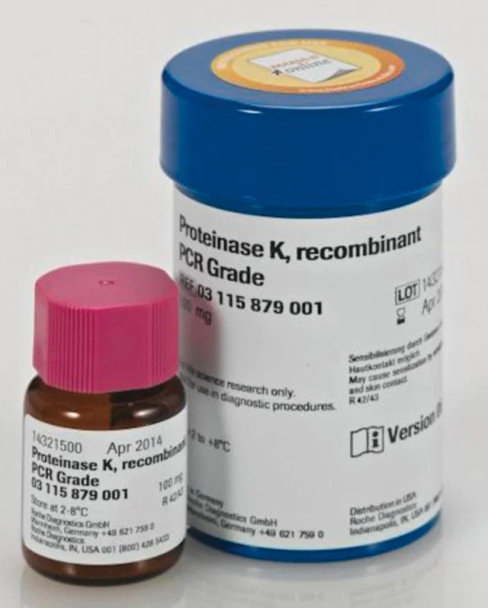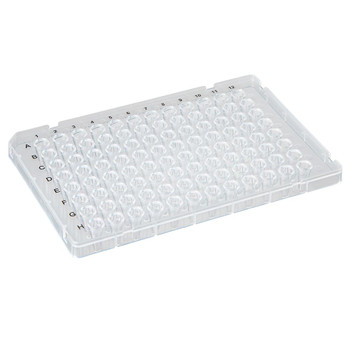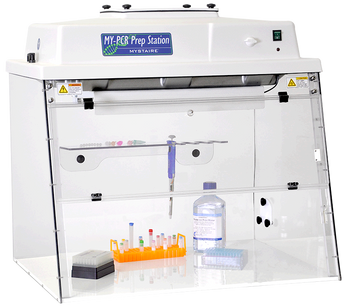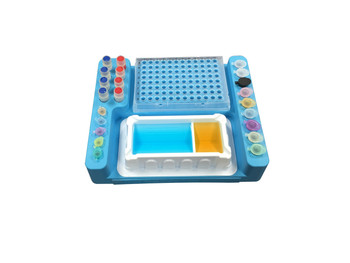MilliporeSigma
Proteinase K, recombinant, PCR Grade, Lyophilizate from Pichia pastoris
- SKU:
- 3115879001
Description
Proteinase K, recombinant, PCR Grade, Lyophilizate from Pichia pastoris
Synonym(s):
proteinase K, pro k
Enzyme Commission number:
3.4.23.1 (BRENDA, IUBMB)
Quality Level
100
form
lyophilized
specific activity
~2 units/mg protein (Approximately 2.0 U/mg lyophilizate (2.5 U/mg protein) when assayed with the Chromozym assay (equivalent to 24 U/mg lyophilizate [30 U/mg protein] with the hemoglobin assay).)
packaging
pkg of 100 mg (03115879001)
pkg of 25 mg (03115836001)
pkg of 2 × 250 mg (03115801001)
pkg of 4 × 250 mg (03115852001)
manufacturer/tradename
Roche
pH range
4.0-12.5
shipped in
wet ice
storage temp.
2-8°C
Proteinase K is a subtilisin-related serine protease. The recombinant enzyme is identical to the native protease originally isolated from the mold Tritirachium album. The specifications of the recombinant enzyme are the same as those of the native protease. The amino acid sequence (molecular weight) and the molecule structure are identical. However, the recombinant preparation is much purer than the native enzyme, as it is DNA-free that has no pronounced cleavage specificity. The enzyme is extremely effective on native proteins and can therefore be used to rapidly inactivate endogenous nucleases such as RNases and DNases. The enzyme is also available as a solution.
Approximately 30 U/mg lyophilizate (hemoglobin assay)
Note: SDS can increase the activity of Proteinase K as much as sevenfold.
- Inhibitors: The enzyme is inactivated by Pefabloc® SC. However, it is not inactivated by metal ions, chelating agents (e.g., EDTA), sulfhydryl reagents, or trypsin and chymotrypsin inhibitors.
- Activators: Proteinase K activity is stimulated by the presence of denaturing agents (SDS and urea).
- pH Optimum: Proteinase K is stable over a wide pH range (4 – 12.5). The enzyme maintains full activity for several hours when incubated at a pH between 6.5 and 9.5.
- Volume Activity:
Approximately 30 U/mg lyophilizate (hemoglobin assay)
Note: SDS can increase the activity of Proteinase K as much as sevenfold.
Specificity
Proteinase K is one of the most active endopeptidases known and does not exhibit any pronounced cleavage specificity. Proteinase K cleaves proteins as follows: X-↓-Y, where X = aliphatic, aromatic, or hydrophobic amino acid, and Y = any amino acid. The enzyme can break down protein material into free amino acids when used in large excess and over long incubation periods.
Application
Proteinase K is one of the most active endopeptidases known. This PCR Grade Proteinase K is particularly suitable for isolating nucleic acids for amplification reactions, as well as:
- The enzyme is extremely effective on native proteins and can therefore be used to rapidly inactivate endogenous nucleases such as RNases and DNases during nucleic acid isolation. This property makes Proteinase K particularly suitable for the isolation of native RNA and DNA from tissues or cell lines.
- The enzyme promotes cell lysis by activating a bacterial autolytic factor.
- Proteinase K is used for the analysis of membrane structures by modifying proteins and glycoproteins on cell surfaces.
- Because the enzyme is tested for the absence of RNases and DNases, and is virtually free of DNA, it is especially suitable for isolating PCR and RT-PCR templates.
- Proteinase K can also be used to remove cellular debris during the preparation of colony lifts, and to treat tissue sections to ensure efficient probe infiltration during in situ hybridization.
Features and Benefits
Proteinase K is a serine protease that has no pronounced cleavage specificity. It cleaves proteins between amino acids X and Y (X-↓-Y), when X = an aliphatic, aromatic, or hydrophobic amino acid, and Y = any amino acid. The enzyme is extremely effective on native proteins and can therefore be used to rapidly inactivate endogenous nucleases such as RNases and DNases.
Note: The enzyme can reduce protein to free amino acids if it is present in large excess for long incubation periods.
Contents
Lyophilizate PCR Grade Proteinase K is also available in solution.
- Choose an effective tool for template preparation. Inactivate DNases and RNases of most species.
- Count on consistent quality and performance. Stringent quality testing ensures optimal stability and high-level lot-to-lot performance.
- Prepare samples over a wide range of conditions. The robust enzyme is stable over a wide pH range and is ideal for diverse applications.
- Benefit from a contamination-free enzyme. The enzyme is tested for the absence of RNases and DNases, and is virtually free of DNA. It is especially suited for the isolation of PCR templates.
Note: The enzyme can reduce protein to free amino acids if it is present in large excess for long incubation periods.
Contents
Lyophilizate PCR Grade Proteinase K is also available in solution.
Quality
This preparation is free of RNases, DNases, and DNA, according to the current Quality Control procedures.
- Absence of Nucleases: Each lot is tested on various substrates to ensure the absence of endonuclease, exonuclease, ribonuclease and nicking activity.
- DNA content: =10 pg/mg enzyme (determined by Threshold)
- Bioburden: <125 cfu/g (determined by the most stringent test from the European Pharmacopoeia, which identifies the total number of viable aerobic bacteria, yeast, and fungi)
Preparation Note
Activator: To stimulate Proteinase K activity, add denaturing agents (SDS and urea). For example, SDS can increase the activity of proteinase K as much as sevenfold compared with the activity exhibited in the absence of SDS.
Working solution: For best results, dissolve Proteinase K, recombinant, PCR Grade, in double-distilled water or Tris buffer. The best buffer for proteinase K will vary from application to application. Always follow the pH and temperature guidelines in parameter field. As a general rule, proteinase K is stable and very active in buffers that contain denaturing reagents such as urea, sodium dodecyl sulfate (SDS), and guanidinium salts.
Storage conditions (working solution): -15 to -25 °C
Working solution: For best results, dissolve Proteinase K, recombinant, PCR Grade, in double-distilled water or Tris buffer. The best buffer for proteinase K will vary from application to application. Always follow the pH and temperature guidelines in parameter field. As a general rule, proteinase K is stable and very active in buffers that contain denaturing reagents such as urea, sodium dodecyl sulfate (SDS), and guanidinium salts.
Storage conditions (working solution): -15 to -25 °C
Reconstitution
Reconstitution in double-dist. water at least up to 20 mg/ml
Other Notes
For life science research only. Not for use in diagnostic procedures.
Lyophilizate PCR Grade Proteinase K is also available in solution.
Lyophilizate PCR Grade Proteinase K is also available in solution.
Legal Information
Pefabloc is a registered trademark of Pentapharm
Pictograms
GHS07,GHS08
Signal Word
Danger
Hazard Statements
H315 - H317 - H319 - H334 - H335
Precautionary Statements
P261 - P264 - P280 - P284 - P304 + P340 + P312 - P342 + P311
Hazard Classifications
Eye Irrit. 2 - Resp. Sens. 1 - Skin Irrit. 2 - Skin Sens. 1 - STOT SE 3
Target Organs
Respiratory system
Storage Class Code
11 - Combustible Solids
WGK
WGK 1
Flash Point(F)
does not flash
Flash Point(C)
does not flash







